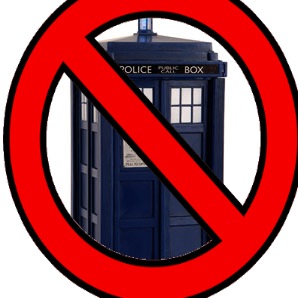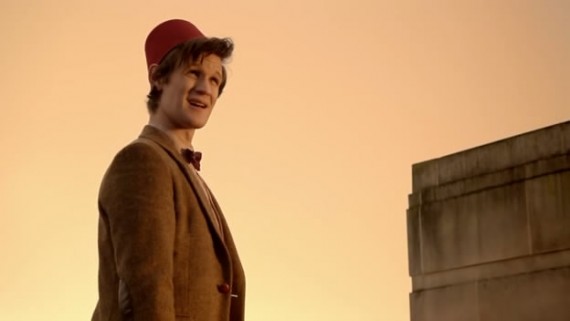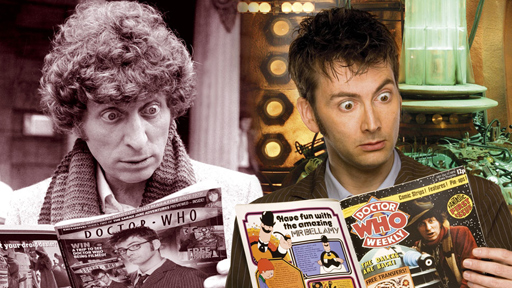There are two generations of Doctor Who fans now. One set of fans is grey or greying and remembers a long scarf, a car named Bessie, a celery stick, and villains made from Bubble Wrap, tin foil and glue. The other, usually teenage, set of Who fans obsess on bow ties, bananas, sometimes leather jackets, and second-rate CGI tricks.
Obviously, many from the first generation are pleased with the results of the second, and some second generation Who fans can appreciate the first generation. Still, a debate is always simmering just below the surface.
It’s a simple question, one that is impossible to answer, but one that we’re compelled to ask nonetheless:
Which Doctor is the best Doctor?
In order to understand this question maybe we should step back and take a look at time travel itself.
China’s Administration for Radio, Film & Television recently issued some guidelines for television producers, one of them being for producers to avoid time travel plots. According to the administration, China’s culture and history have to be protected from puerile fantasies and television programs that implement the time travel trope, as they “casually make up myths, have monstrous and weird plots, use absurd tactics, and even promote feudalism, superstition, fatalism, and reincarnation.” (As reported in the New York Times).
 The Chinese state realizes that time travel is a tool for imagining and understanding both history and the future, and if we too think of time travel this way then the question “Who is the best Doctor?” runs a little deeper than we initially thought. The nearly fifty year old time travel program is really the history of the way we, in the English-speaking world, imagine both our future and our origins, so this question of “who is the best” might matter more heavily than usual.
The Chinese state realizes that time travel is a tool for imagining and understanding both history and the future, and if we too think of time travel this way then the question “Who is the best Doctor?” runs a little deeper than we initially thought. The nearly fifty year old time travel program is really the history of the way we, in the English-speaking world, imagine both our future and our origins, so this question of “who is the best” might matter more heavily than usual.
“If I were inclined to detail the contradictions existing in society, it would be necessary to write the history of mankind.” – Voltaire, The Philosophical Dictionary
“The history of all hitherto existing society is the history of class struggles.” -Karl Marx, Communist Manifesto
Here’s my premise: Voltaire and Marx are saying the same thing in different ways.
What this means is that the different eras of Doctor Who represent different attempts to answer the deadlock at the center of history, to address the problem of the contradiction or class struggle. The symptoms of this contradiction, or class struggle, are easy to spot. For instance, today our society produces an overabundance of commodities of all kinds and yet many still starve.
Another way to think about the contradiction that defines history is to think about the concept of God as we find it in Voltaire’s dictionary. Voltaire quotes the theologian Vanni: “[God] is in all, without being enclosed; out of everything, without being excluded from anything; good, but without quality; entire, but without parts; immutable, while changing the whole universe…”
So, again, time travel is a particularly relevant literary trope because it is itself prone to contradictions and because it speaks to the problem of our origins and our possibilities. Further, the history of Doctor Who is the history of how we’ve imagined solutions to the contradiction that drives history.

“Tom Baker is probably the most definitive Doctor. I go to America, and that’s who everyone dresses up as. It’s Baker. It’s the scarf, and the hat, and that long personality that matches his coat. It reminds you of what a wonderful history you’re part of. Once you’re in this show, it really latches on to you. It’s incredible. His Doctor is absolutely the same man as mine.” – Matt Smith
So, who is the best Doctor? Let’s narrow this down to a contest between the current incarnation, the Eleventh, and the one this current Doctor says is definitive, the Fourth. Further, let’s compare two stories from each era, two stories that revolve around the problem of history, of origins, and of contradictions.
So, to rephrase this, which is the better episode? “The City of Death” or the episodes “The Pandorica Opens” and “The Big Bang”?
“The City of Death” was written in part by Douglas Adams. Adams was most famous for his Hitchhiker’s Guide to the Galaxy series, but he is also beloved for his work on Who.
How did Douglas Adams solve the problem of the deadlock ? His was the story of how a contradiction (and its fragmented results) is always necessary. In his episode the Doctor must make sure that the contradiction happens.
 An alien named Scaroth is the last of the alien race known as the Jagaroth and, due to a rocket malfunction and explosion 400 million years earlier, Scaroth has been split into multiple versions of himself and scattered through time. The secret of the episode is that Scaroth has been driving human history in order to motivate humanity into building a time machine so that Scaroth can travel back 400 million years and stop the accident. What the Doctor learns is that Scaroth’s accident is necessary. The explosion kicked off the biochemical reaction that started life on Earth. The Doctor has to stop Scaroth before Scaroth stops the problem. The Doctor has to make sure that the accident does happen; he has to protect the precondition of an alien conspiracy while thwarting the conspiracy itself.
An alien named Scaroth is the last of the alien race known as the Jagaroth and, due to a rocket malfunction and explosion 400 million years earlier, Scaroth has been split into multiple versions of himself and scattered through time. The secret of the episode is that Scaroth has been driving human history in order to motivate humanity into building a time machine so that Scaroth can travel back 400 million years and stop the accident. What the Doctor learns is that Scaroth’s accident is necessary. The explosion kicked off the biochemical reaction that started life on Earth. The Doctor has to stop Scaroth before Scaroth stops the problem. The Doctor has to make sure that the accident does happen; he has to protect the precondition of an alien conspiracy while thwarting the conspiracy itself.
In Stephen Moffat’s “The Pandorica Opens” there was an accident at the end of history (rather than the beginning of life), and this time the ship that explodes is the TARDIS. Rather than protecting the accident, the Doctor has to conspire to stop the accident. The Doctor is effectively Scaroth. He is the last of the Time Lords at the end of the universe.
And there are plenty more parallels. In “The City of Death” the authentic duplications of the Mona Lisa are evidence of the accident at the beginning of history. In “The Pandorica Opens” a lost painting by Van Gogh (a painting of the TARDIS) is evidence of the coming end of time. In “The City of Death” the Doctor parks his TARDIS in the Louvre where it is mistaken for a work of modern art. In “The Big Bang,” the Pandorica is on display at the National Museum and it is taken to be a work of art from antiquity.
Ultimately, in “The City of Death” the Doctor is a benevolent outsider working to maintain the troubled and manipulated everyday existence of humanity, whereas in “The Pandorica Opens“ and ”The Big Bang” the Doctor is himself the very problem that set the entire universe into motion.
So, here’s the result:
Matt Smith’s Doctor is Tom Baker’s Doctor perfected. In the 70s, Baker’s bohemian Doctor represented a kind of rebellious independence, whereas in 2012 Matt Smith’s quirky Doctor with his love of fish sticks and custard, his ability to talk to babies, his pronouncement that “Bow ties are cool!” and his longing for a fez, is this same bohemian Doctor only after he has been brought into the very center of history. Whereas Tom Baker’s Doctor was an alien, Matt Smith’s Doctor is the fantasy that results from our central alienation. Tom Baker protects and sees and loves the distortion that drives history, while Matt Smith’s Doctor is the distortion. Baker’s Doctor is whimsical and perverse, whereas Matt Smith’s is perversion itself.
Douglas Lain is a fiction writer, a “pop philosopher” for the popular blog Thought Catalog, the Partially Examined Life, and Right Where You’re Sitting Now. His most recent book, a novella entitled “Wave of Mutilation,” was published by Fantastic Planet Press (an imprint of Eraserhead) in October of 2011, and his first novel, entitled “Billy Moon: 1968” is due out from Tor Books in 2013. You can find him on Facebook and Twitter. He is the podcaster behind the Diet Soap Podcast.










